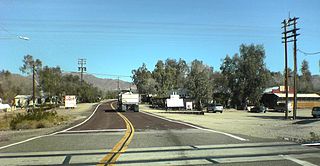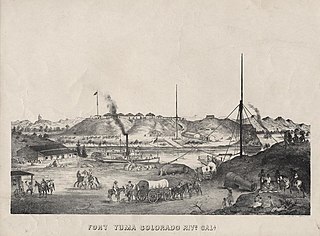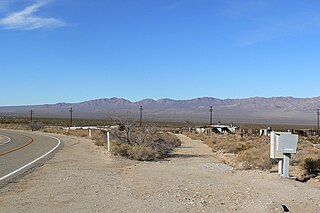
Nipton is an unincorporated community with a population of about 15 - 20, in San Bernardino County, California, on the northeastern border of Mojave National Preserve, approximately 12 miles southeast of Primm, Nevada and the Ivanpah Solar Power Facility. It is accessible via Nevada State Route 164.
Bagdad is a ghost town in the Mojave Desert, in San Bernardino County, California.

Yermo is a town in the Mojave Desert in San Bernardino County, California. Its name is derived from one of the Spanish words for "wilderness". It is 13 miles east of Barstow on Interstate 15, just south of the Calico Mountains. Its population was an estimated 1,750 in 2009.

Daggett is an unincorporated community located in San Bernardino County, California in the United States. The town is located on Interstate 40 ten miles (16 km) east of Barstow. The town has a population of about 200. The ZIP code is 92327 and the community is inside area code 760.

The Piute Range is located in the Mojave Desert, primarily in northeast San Bernardino County, California, United States, with a north portion in Nevada. Most of the range is the eastern border of the Mojave National Preserve, a National Park Service natural area and park.

Ivanpah Lake is a dry lake bed in the Mojave Desert of San Bernardino County, California on the border of California and Nevada. Nestled in the Ivanpah Valley near Primm on Interstate 15, the 13-square-mile (34 km2) lake is almost entirely within California. At the north edge of the lake lie the Nevada Welcome Center (closed) and a California Lottery retailer. It is a popular place for land sailing and kite buggying.

The Borate and Daggett Railroad was a 3 ft narrow gauge railroad built to carry borax in the Mojave Desert. The railroad ran about 11 miles (18 km) from Daggett, California, US, to the mining camp of Borate, three miles (4.8 km) to the east of Calico.

Ludlow is an unincorporated community in the Mojave Desert on Interstate 40, located in San Bernardino County, California, United States. The older remains of the ghost town are along historic Route 66.

Ivanpah was a short-lived silver mining town located in San Bernardino County, California, United States. It was founded in 1869 and existed until at least the mid-1880s.

Hart was a short-lived gold mining town located in the Mojave desert, in San Bernardino County, California. It existed between 1908 and 1915, and was located on the northeastern edge of Lanfair Valley near the New York Mountains. The area is now in the Mojave National Preserve, directed by the National Park Service.

Providence was a short-lived silver mining town located in San Bernardino County, California, United States. It existed between 1880 and 1886.

The Piute Valley is a 45-mile-long (72 km) north–south valley southeast of Las Vegas, Nevada, and northwest of Needles. The north of the valley is at Searchlight, with some of the valley extending northwest from Searchlight. At the center-north lies Cal-Nev-Ari, Nevada.

The Waterloo Mining Railroad, also known as the Calico Railroad or Daggett-Calico Railroad, was a 3 ft narrow gauge railroad built to carry silver ore from the mines in the Calico Mountains north of Calico to the mills located at Elephant Mountain near Daggett, California from 1888 to 1903.

Steamboats on the Colorado River operated from the river mouth at the Colorado River Delta on the Gulf of California in Mexico, up to the Virgin River on the Lower Colorado River Valley in the Southwestern United States from 1852 until 1909, when the construction of the Laguna Dam was completed. The shallow draft paddle steamers were found to be the most economical way to ship goods between the Pacific Ocean ports and settlements and mines along the lower river, putting in at landings in Sonora state, Baja California Territory, California state, Arizona Territory, New Mexico Territory, and Nevada state. They remained the primary means of transportation of freight until the advent of the more economical railroads began cutting away at their business from 1878 when the first line entered Arizona Territory.

California Eastern Railway, is a defunct 45-mile short-line railroad that operated from 1902 - 1911. The railroad ran from Goffs, California, to Ivanpah. It was first a private line operated by a mining company, that was acquired by the Atchison, Topeka and Santa Fe Railway.
Quartette or Quartette Mill or Quartette Landing, was a mining settlement, location of the stamp mill of the Quartette Mining Company, owner of the largest mine in the Searchlight Mining District and a steamboat landing on the Colorado River, in what is now Clark County, Nevada. It lay at an elevation of 646 feet.

















